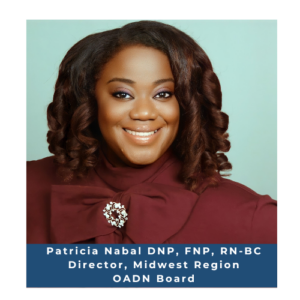October 3, 2023

Dear OADN Members,
I hope this message finds each of you in good health and high spirits as we welcome the vibrant autumn season! Just as Mother Nature is undergoing her natural course, we too are witnessing a transformative shift in healthcare and, consequently, nursing education.
In the aftermath of a global pandemic, which we dare not claim to have fully overcome, combined with disconcerting shifts in legislation, and persistent social challenges such as police brutality, racial inequality, and health care disparities and the marginalization of LGBTQ individuals, it is evident that our communities are experiencing significant changes. Moreover, as the tapestry of our society is being redefined in terms of “race, ethnicity, gender identity, age, national origin, immigration status, religion, values, political identity, functional ability, sexuality, socioeconomic status, education, marital status, language, learning preferences, and career goals,” the necessity for nursing curricula that reflect this evolving reality could not be more apparent. The call for a nursing workforce distinguished by heightened empathy and cultural competence is now more urgent than ever before. Achieving this requires nursing curricula that truly acknowledges the lived experiences of the communities it serves.
Diversity, equity, and inclusion (DEI) have emerged as formidable responses to the call for change in nursing education. As the national voice for community college nursing education and associate degree nursing pathways, the Organization For Associate Degree Nursing (OADN) is committed to advancing the principles of DEI in nursing education. This commitment has led to the introduction of the OADN Toolkit.
I have the distinct privilege of serving as Co-Chair of the OADN DEI Committee. In response to the shifting demographics and evolving needs of our communities, the OADN Toolkit was developed by the committee as a proactive step towards integrating DEI strategies in nursing curricula and fostering a nursing workforce that better represents and understands the diverse makeup of our society. OADN recognizes that to deliver culturally competent care, our nursing workforce must mirror the diversity of our current communities. Hence, the toolkit aims to equip educators, students, and administrators with the tools necessary to evaluate and transform nursing curricula to meet the needs of a rapidly changing society.
The toolkit is a collection of resources, drawing from the insights of nursing experts, designed to guide you through the process of assessing and implementing DEI concepts into your nursing curriculum. I urge each of you to access the OADN Toolkit, not as a prescription plan but as a versatile framework to guide your efforts towards a more inclusive and equitable nursing education curriculum. Employ it to scrutinize your existing curriculum, identify potential gaps, and put into practice evidence-based DEI strategies. Also, I hope you will consider joining me for a special session on Incorporating Diversity, Equity & Inclusion in Associate Degree Nursing Education as I introduce the OADN Toolkit at 9AM PDT on Saturday, November 18th during the OADN Convention, Turning the Tide of Nursing Education, this November 15th – 18th at the Manchester Grand Hyatt in San Diego, California. 2023 OADN Convention Schedule
As we usher into a new season, the OADN Toolkit signifies a commitment to embracing change and progress in nursing education. Consider it a compass, guiding us toward a future where nursing education reflects the richness of our communities and equips our nursing workforce with the skills, knowledge, and compassion needed to provide exceptional care to all individuals, regardless of their background or circumstances. Together, we can shape the future of nursing education and make a lasting impact on the health and well-being of our society.
Patricia Nabal, DNP, FNP, RN-BC
OADN Midwest Regional Director
Associate Dean, Nursing (AAS)
City Colleges of Chicago School of Nursing, Malcom X College